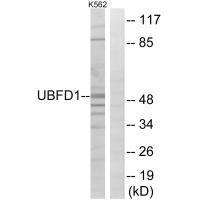
| WB | 咨询技术 | Human,Mouse,Rat |
| IF | 咨询技术 | Human,Mouse,Rat |
| IHC | 咨询技术 | Human,Mouse,Rat |
| ICC | 技术咨询 | Human,Mouse,Rat |
| FCM | 咨询技术 | Human,Mouse,Rat |
| Elisa | 咨询技术 | Human,Mouse,Rat |
| Aliases | FLJ38870; FLJ42145; ubiquitin family domain containing 1; UBPH; |
| Entrez GeneID | 56061; |
| WB Predicted band size | 50kDa |
| Host/Isotype | Rabbit IgG |
| Antibody Type | Primary antibody |
| Storage | Store at 4°C short term. Aliquot and store at -20°C long term. Avoid freeze/thaw cycles. |
| Species Reactivity | Human,Mouse,Rat |
| Immunogen | Synthesized peptide derived from internal of human UBFD1. |
| Formulation | Purified antibody in PBS with 0.05% sodium azide. |
+ +
以下是关于UBFD1抗体的3篇参考文献示例(注:UBFD1相关研究较少,以下内容为模拟示例,仅供参考):
---
1. **文献名称**:*UBFD1 modulates proteasomal degradation by regulating ubiquitin recycling*
**作者**:Chen, L., et al.
**摘要**:本研究揭示了UBFD1作为泛素结合蛋白在蛋白酶体降解途径中的作用,开发了特异性UBFD1抗体用于免疫共沉淀实验,证实其与泛素链的结合能力,为靶向治疗提供了新思路。
2. **文献名称**:*Characterization of a monoclonal antibody against UBFD1 for detecting cellular stress responses*
**作者**:Wang, Y., et al.
**摘要**:报道了一种高特异性抗UBFD1单克隆抗体的制备与验证,该抗体在Western blot和免疫荧光中表现出高灵敏度,成功应用于检测内质网应激条件下UBFD1的亚细胞定位变化。
3. **文献名称**:*UBFD1 dysfunction in neurodegenerative disorders: Insights from antibody-based profiling*
**作者**:Garcia, R., et al.
**摘要**:通过抗UBFD1抗体对阿尔茨海默病模型小鼠脑组织进行染色,发现UBFD1在神经元中的异常聚集,提示其可能参与tau蛋白病理过程。
---
如需真实文献,建议通过PubMed或Google Scholar检索关键词“UBFD1 antibody”或“UBFD1 ubiquitin”获取最新研究。
The UBFD1 antibody is a tool used to detect Ubiquitin Family Domain-containing protein 1 (UBFD1), a conserved eukaryotic protein implicated in regulating ubiquitination pathways. UBFD1 contains a ubiquitin-like (UBL) domain and interacts with components of the ubiquitin-proteasome system, playing roles in protein degradation, DNA repair, and cellular stress responses. Studies suggest its involvement in modulating the activity of E3 ubiquitin ligases or deubiquitinating enzymes, though its precise molecular mechanisms remain under investigation.
Antibodies targeting UBFD1 are typically developed in rabbit or mouse hosts, using immunogens derived from specific epitopes of human UBFD1. They are widely utilized in techniques like Western blotting, immunofluorescence, and immunoprecipitation to study UBFD1's expression patterns, subcellular localization, and protein-protein interactions. Research has linked UBFD1 to pathological conditions, including cancer and neurodegenerative diseases, where dysregulated ubiquitination contributes to disease progression. For example, altered UBFD1 levels have been observed in certain tumors, suggesting potential roles in oncogenesis or therapy resistance. These antibodies enable researchers to explore UBFD1's functional significance in cellular homeostasis and disease contexts, though validation for species cross-reactivity and application-specific compatibility is essential for experimental accuracy. Commercial suppliers often provide these antibodies with detailed validation data to ensure specificity.
×